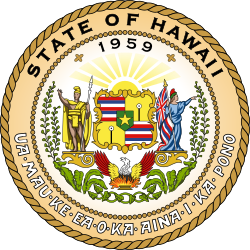| ||||||||||||||||||||||||||||
All 2 Hawaii seats to the United States House of Representatives | ||||||||||||||||||||||||||||
|---|---|---|---|---|---|---|---|---|---|---|---|---|---|---|---|---|---|---|---|---|---|---|---|---|---|---|---|---|
| ||||||||||||||||||||||||||||
 County results Democratic: 60–70% | ||||||||||||||||||||||||||||
| Elections in Hawaii |
|---|
 |
The 2004 House elections in Hawaii occurred on November 2, 2004, to elect the members of the State of Hawaii's delegation to the United States House of Representatives. Hawaii had two seats in the House, apportioned according to the 2000 United States census.
Contents
These elections were held concurrently with the United States presidential election of 2004, United States Senate elections of 2004 (including one in Hawaii), the United States House elections in other states, and various state and local elections.